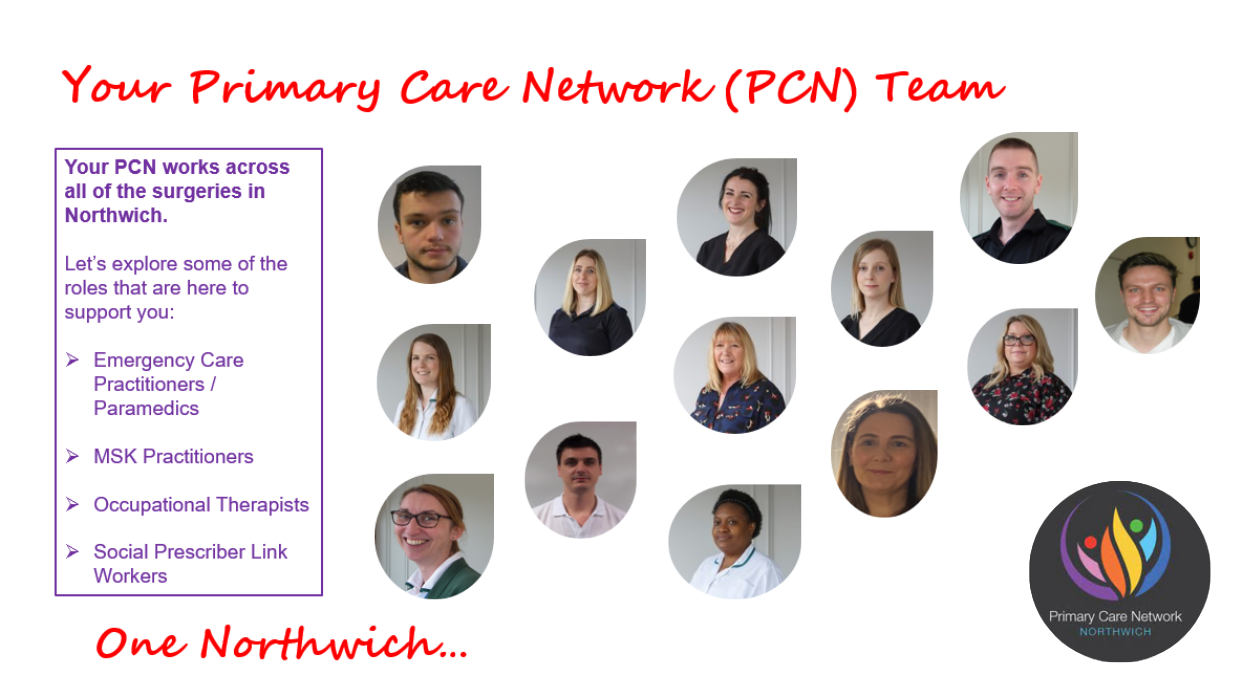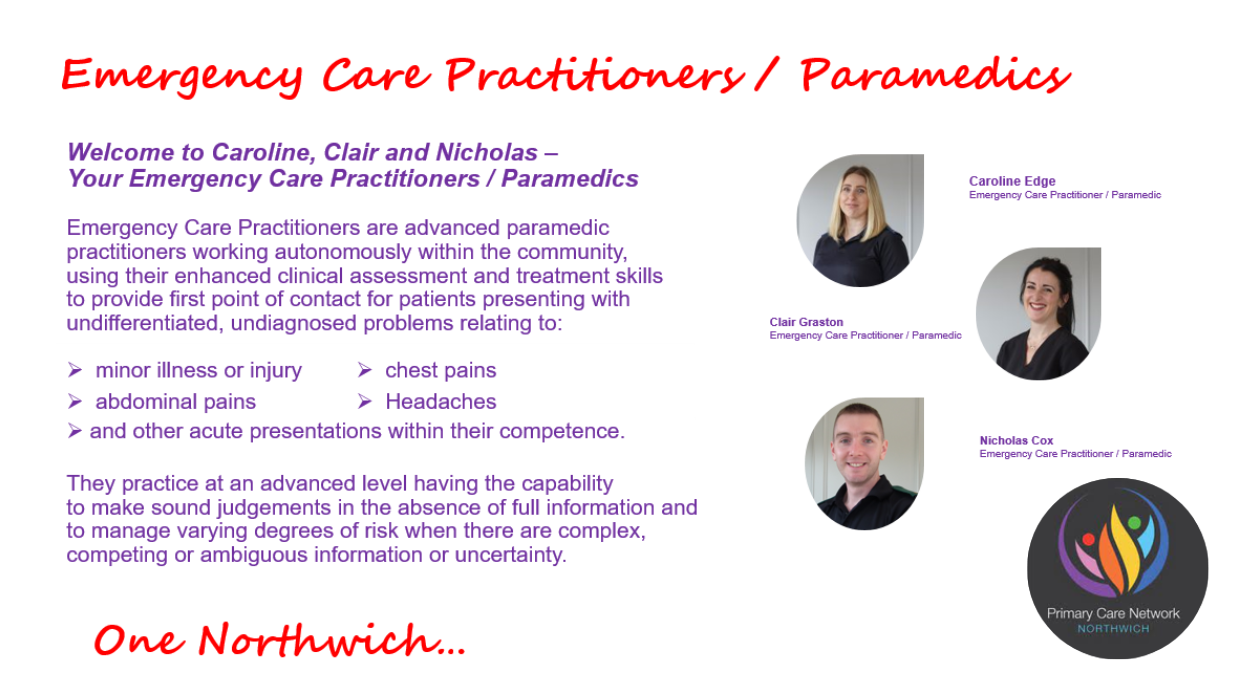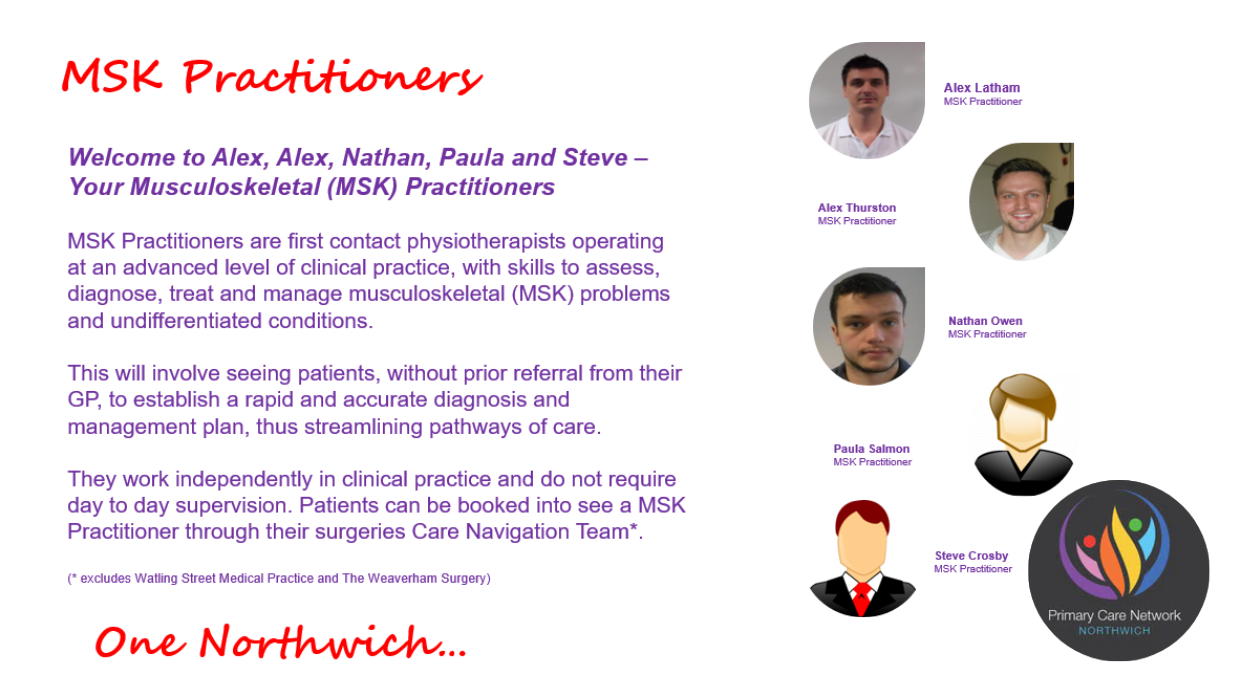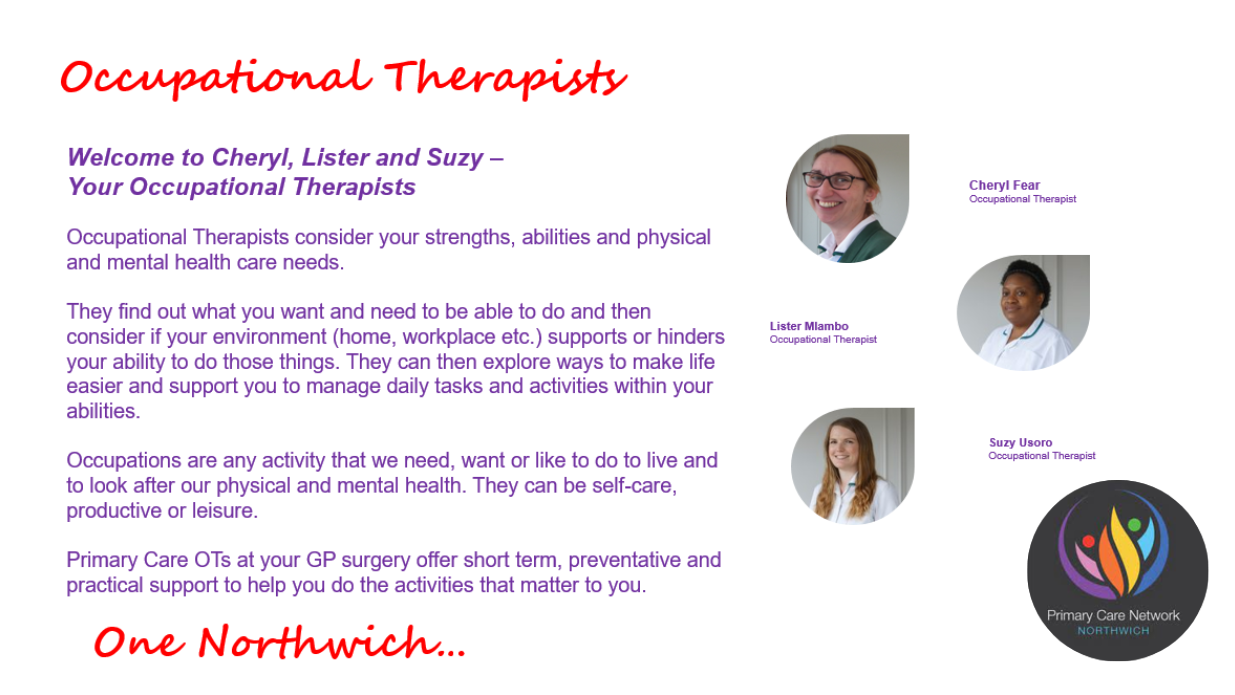You can search to find your nearest optometry practice providing the Minor and Urgent Eye Care services or the Easy Eye Care service for patients with learning disabilities or autism at: Find a Practice – Search for your nearest participating optical practice
Your Primary Care Network (PCN) Team
Care Co-ordinator
Your Care Co-ordinators at Middlewich Road are Joanne and Jane. Care co-ordinators within GP practices, act as a central point of support for patients to review needs and coordinate services allowing them to access what they need, when they need it.
Who we can help
Examples of patients who may want to access the service are:
- Recently discharged patients with ongoing care needs
- Patient with a new diagnosis who may need support from local or national groups
- Patients with long term or complex care needs
- Patients who frequently access the practice and/or other care environments
Non-urgent advice: How do I get a referral to these services?
MSK Practitioner
MSK practitioners are first contact physiotherapists operating at an advanced level of clinical practice, with skills to assess, diagnose, treat and manage musculoskeletal (MSK) problems and undifferentiated conditions.
This will involve seeing patients, without prior referral form from their GP, to establish a rapid and accurate diagnosis; including ordering imaging, developing a management plan, and referring, if necessary.
They work independently in clinical practice and do not require day to day supervision.
Social Prescriber
What is Social Prescribing?
Social Prescribing empowers people to take control of their health and wellbeing through referral to ‘link workers’ who give time, focus on ‘what matters to me’ and take a holistic approach to an individual’s health and wellbeing, connecting people to community groups and services for practical and emotional support.
Social Prescriber referrals are for patients with issues that are impacting on health and wellbeing. They are not clinical support but can provide support and information on different areas.
Areas of Support
Housing
Social Isolation
Employment
Carer Support
Bereavement
Non-urgent advice:
What happens if I’m asked to speak to a Social Prescriber?
One of the team, Donna, Lauren, Wendy or Karen will contact you usually by telephone initially and a convenient appointment will be arranged. These can be via telephone or in person. They will ask you a bit about yourself and explain the support they can offer you.
Additional Roles Reimbursement Scheme (ARRS)
Clinical Pharmacist
Clinical pharmacists work in primary care as part of a multidisciplinary team in a patient facing role to clinically assess and treat patients using expert knowledge of medicines for specific disease areas. They work with and alongside the general practice team, taking responsibility for patients with chronic diseases and undertaking clinical medication reviews to proactively manage people with complex polypharmacy, especially for the elderly, people in care homes and those with multiple comorbidities.
Dietitian
Dietitians are healthcare professionals that diagnose and treat diet and nutritional problems, both at an individual patient and wider public health level. Working in a variety of settings with patients of all ages, dietitians support changes to food intake to address diabetes, food allergies, coeliac disease and metabolic diseases. Dietitians also translate public health and scientific research on food, health and disease into practical guidance to enable people to make appropriate lifestyle and food choices.
First Contact Physiotherapist
First Contact Physiotherapists (FCPs) are qualified autonomous clinical practitioners who can assess, diagnose, treat, and manage musculoskeletal (MSK) problems and undifferentiated conditions and – where appropriate – discharge a person without a medical referral. FCPs working in this role can be accessed directly by self-referral or by staff in GP practices who can direct patients to them to establish a rapid and accurate diagnosis and management plan to streamline pathways of care.
Occupational therapist
Occupational therapists (OTs) support people of all ages with problems resulting from physical, mental, social, or development difficulties. OTs provide interventions that help people find ways to continue with everyday activities that are important to them. This could involve learning new ways to do things or making changes to their environment to make things easier. As patients’ needs are so varied, OTs help GPs to support patients who are frail, with complex needs, live with chronic physical or mental health conditions, manage anxiety or depression, require advice to return or remain in work and need rehabilitation so they can continue with previous occupations (activities of daily living).
Care Coordinator
Care Coordinators play an important role within the PCN (Primary Care Network) to proactively identify and work with people, including the frail/elderly and those with long-term conditions, to provide coordination and navigation of care and support across health and care services.
Care Coordinators provide extra time, capacity, and expertise to support patients in preparing for or in following-up clinical conversations they have with primary care professionals. They will work closely with the GPs and other primary care professionals within the PCN to identify and manage a caseload of identified patients, making sure that appropriate support is made available to them and their carers, and ensuring that their changing needs are addressed. This is achieved by bringing together all the information about a person’s identified care and support needs and exploring options to meet these within a single personalised care and support plan, based on what matters to the person.
Social Prescribing Link Worker
Social prescribing enables all primary care staff and local agencies to refer people to a link worker. Link workers give people time and focus on what matters to the person as identified through shared decision making or personalised care and support planning. They connect people to community groups and agencies for practical and emotional support. They work within multidisciplinary teams and collaborate with local partners to support community groups to be accessible and sustainable and help people to start new groups. Social prescribing complements other approaches such as ‘active signposting’. Link workers typically support people on average over 6-12 contacts (including phone calls, meetings and home visits)
Community Paramedic
First contact Paramedics deliver a high standard of patient care within the practice, working at the top of their clinical scope of practice. As a member of a varied clinical team, they manage a clinical caseload, dealing with presenting patients’ needs within a primary care setting, ensuring patient choice and ease of access to services. They support the Same Day Care team within the practice e.g. minor injury and illness, abdominal pains, chest pain, tiredness, and headache. They also mentor and support staff in developing and maintaining clinical skills.
PRIVATE ADHD PRESCRIBING
“ADHD Shared Care Agreements” with private providers
Sometimes the care of a patient is shared between two doctors, usually a GP and a specialist, and there is a formalised written ‘shared care agreement’ setting out the position of each, to which both parties have willingly agreed. Where these arrangements are in place, GP providers can arrange the prescriptions and appropriate investigations, and the results are fully dealt with by clinicians with the necessary competence under the shared care arrangement. There is NHS guidance available about this.
Shared Care with private providers is not recommended due to the general NHS constitution principle of keeping as clear a separation as possible between private and NHS care. Shared Care is currently set up as an NHS service, and entering into a shared care arrangement may have implications around governance and quality assurance as well as promoting health inequalities. A private patient seeking access to shared care should therefore have their care completely transferred to the NHS. Shared care may be appropriate where private providers are providing commissioned NHS services and where appropriate shared care arrangements are in place.
All shared care arrangements are voluntary, so even where agreements are in place, practices can decline shared care requests on clinical and capacity grounds. The responsibility for the patient’s care and ongoing prescribing then remains the responsibility of the private provider.
As a Practice we are following the BMA guidance, around private ADHD shared care agreements. Presently we are not commissioned for most private ADHD services and are therefore, not required to sign up for all private shared care agreements offering ADHD care, other than with Psychiatry-UK.
We understand that this is frustrating, but presently and until we are authorised to include other ADHD services we are abiding to the BMA guidance.
Patients suspecting ADHD must consult with their GP, who will arrange a Psychiatry-UK referral for assessment.
Non-NHS Services
Some services provided are not covered under our contract with the NHS and therefore attract charges.
Examples
- Medicals for pre-employment, sports and driving requirements (HGV, PSV etc.)
- Insurance claim forms
- Prescriptions for taking medication abroad
- Private sick notes
- Vaccination certificates
The fees charged are based on the British Medical Association (BMA) suggested scales and our reception staff will be happy to advise you about them along with appointment availability.
Please note: Passports and shotgun licences are no longer signed by the doctor.
Domestic Violence and Abuse
The staff in your practice are trained about domestic abuse and specialist workers are available to support you. Your practice is an IRIS practice. You can talk to doctors, nurses and other staff working here if you are being hurt or controlled by your current or ex-partner, are afraid of someone at home or a member of your family.
You can also contact 0300 123 7047 option 2 and ask to speak to your local IRIS Advocate Educator.
The Open the Door website also has lots of information to help if you or someone you know who is in a relationship that doesn’t quite feel right. Visit the link below for advice and access to self-support services:
Online security
If you’re worried about someone knowing you have visited this website and other domestic abuse pages from your computer please visit:
Carers Trust
The Carers Trust have developed an online registration form which carers can now use to register as a carer. You can access the form below:
The Carers Trust also have a helpline which is available Monday-Friday 9.00am-5.00pm for information, support and advice. Call 0300 102 0008.
There is also a free Emergency Card service which helps carers establish a contingency plan in the event of an emergency to ensure the person they support is cared for if need be. Please call The Carers Trust for more information.
Funding is also available to allow carers to take a break from their caring role (called a Personal Budget). We appreciate this will be difficult under the current social restrictions, but carers may be able to use the funding for home based activities like gardening, buying plants and equipment, crafts activities. Call The Carers Trust for more information.
There is also a fund which can help to replace any broken down items in the home such as white goods, which are essential to a caring role (this is called the Essentials Fund). Call The Carers Trust for more information.
We’re able to help with benefits and queries, and any appointment requests are being done over the telephone.
Wellbeing Hub Mental Health Service
Cheshire and Wirral Partnership NHS Foundation Trust (CWP) was formed in 2002 and achieved Foundation Trust status in 2007. We provide health and care services for local people, including mental health, learning disability, community physical health and all-age disability care – including the provision of three GP surgeries.
Non-urgent advice: Contact Details
Telephone: 0300 303 0639
Think Pharmacy – Minor Ailments Scheme
Pharmacists play a key role in providing quality healthcare to patients. Working in the community, pharmacists use their clinical expertise together with their practical knowledge to ensure the safe supply and use of medicines by patients and members of the public.
Many pharmacies in the local area offer the ‘Think Pharmacy’ service. This service is an alternative to visiting your GP, making it easier for you and your family to get healthcare and advice on minor ailments at a time that suits you.
Your local pharmacy can offer advice and if necessary, prescribe medication to treat the following ailments under the Minor Ailments service:
Ailments
Conjunctivitis
Cystitis
Impetigo
Oral thrush in babies
Scabies
Threadworm
Vaginal thrush
Pharmacists can also offer advice on common problems such as coughs, colds, aches and pains as well as healthy eating and stopping smoking.
You can talk to your pharmacist in confidence, even about the most personal symptoms and you don’t need to make an appointment; most pharmacies now have a private consultation area where patients can discuss issues with pharmacy staff without being overheard by other members of the public.
Consultations are always free and confidential, regardless of whether the pharmacist gives you any medication.
Self Certification/ Sick Note
How do I get a sick note?
You do not require a doctor’s sickness certificate for any illness lasting seven days or less. Your employer may however require you to complete a self-certification form (SC2) which is available from your employer or on the HMRC website.
Evidence that you are sick
If you are sick for more than seven days, your employer can ask you to give them some form of medical evidence to support payment of SSP (statutory sick pay).
It is up to your employer to decide whether you are incapable of work. A medical certificate, now called a ‘Statement of Fitness for Work’ (see below) from your doctor is strong evidence that you are sick and would normally be accepted, unless there is evidence to prove otherwise.
You could also provide evidence from someone who is not a medical practitioner, e.g. a dentist. Your employer will decide whether or not this evidence is acceptable. If your employer has any doubts, they may still ask for a medical certificate from your GP.
Statement of Fitness for Work – ’Fit Note’
The ‘fit note’ was introduced on 6 April 2010. With your employer’s support, the note will help you return to work sooner by providing more information about the effects of your illness or injury.
For more information see:




